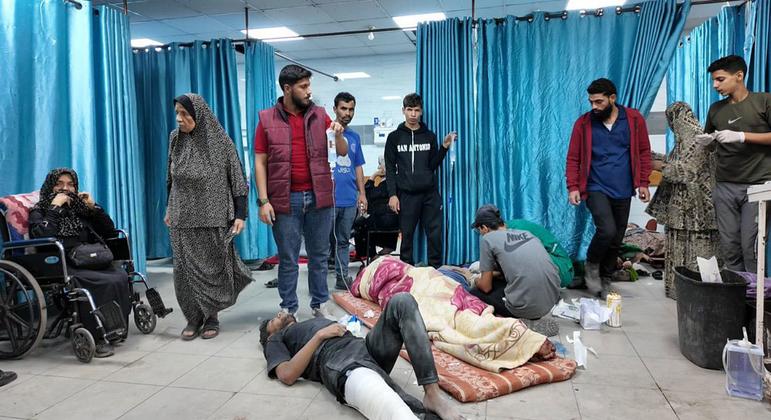The United Nations Security Council convened on a Friday morning in New York to address the dire situation regarding the collapse of health services in Gaza. The meeting was initiated by Algeria, a key representative of the Arab world on the Council and the current holder of the presidency for the month of January. Present at the meeting were senior officials from the World Health Organization (WHO), including Rik Peeperkorn, who provided crucial insights and updates on the healthcare crisis in Gaza. Additionally, High Commissioner for Human Rights Volker Turk also briefed ambassadors on the disturbing developments unfolding in the region.
The deteriorating health services in Gaza have been a growing concern for the international community, prompting urgent discussions and actions to address the escalating humanitarian crisis. The situation has reached a critical point, with the lives and well-being of countless individuals at risk due to the lack of access to essential medical care and services. The UN Security Council’s meeting served as a platform for member states to deliberate on potential solutions and strategies to alleviate the suffering of the people in Gaza.
Algeria’s role as the leading voice for the Arab world on the Council underscored the importance of addressing the healthcare crisis in Gaza from a regional perspective. As the current president of the Security Council for the month of January, Algeria assumed a critical leadership role in facilitating discussions and coordinating efforts to address the urgent needs of the population in Gaza. The country’s proactive stance on the issue demonstrated a commitment to promoting peace, stability, and human rights in the region.
The presence of senior officials from the World Health Organization (WHO) at the Security Council meeting highlighted the gravity of the healthcare crisis in Gaza. Rik Peeperkorn, a key representative of the WHO, provided valuable insights and updates on the current situation on the ground, shedding light on the challenges faced by healthcare workers and facilities in Gaza. His expertise and first-hand knowledge of the healthcare system in the region were instrumental in guiding the discussions and shaping potential solutions to address the crisis.
High Commissioner for Human Rights Volker Turk also played a crucial role in briefing ambassadors at the Security Council meeting on the human rights implications of the healthcare crisis in Gaza. As the head of the Office of the High Commissioner for Human Rights (OHCHR), Turk highlighted the violations of human rights and international law that have occurred as a result of the collapse of health services in Gaza. His testimony underscored the urgent need for action to protect the rights and dignity of the population in Gaza and ensure access to essential healthcare services.
The Security Council meeting served as a platform for member states to engage in constructive dialogue and explore potential avenues for addressing the healthcare crisis in Gaza. The discussions focused on identifying immediate needs, mobilizing resources, and coordinating efforts to provide humanitarian assistance to the population in Gaza. Member states expressed solidarity with the people of Gaza and reaffirmed their commitment to upholding human rights, promoting peace, and advancing the well-being of all individuals in the region.
As the meeting progressed, ambassadors exchanged views on the root causes of the healthcare crisis in Gaza and discussed potential long-term solutions to address the underlying issues. The impact of the ongoing conflict, the blockade, and the lack of resources on the healthcare system in Gaza were among the key factors identified as contributing to the crisis. Member states emphasized the importance of addressing these structural challenges and working towards sustainable solutions that would ensure the provision of quality healthcare services to the population in Gaza.
The Security Council meeting also provided an opportunity for member states to reaffirm their commitment to the principles of international law, human rights, and humanitarian assistance. Ambassadors reiterated the importance of respecting the rights and dignity of all individuals, regardless of their nationality, ethnicity, or political affiliation. They called for an immediate cessation of hostilities, the lifting of restrictions on humanitarian access, and the protection of healthcare workers and facilities in Gaza.
In the face of the healthcare crisis in Gaza, the international community must come together to support the people in need and provide the necessary assistance to alleviate their suffering. The Security Council meeting underscored the urgency of the situation and the need for collective action to address the healthcare crisis in Gaza. Member states must work together to mobilize resources, coordinate efforts, and implement effective strategies to ensure access to essential healthcare services for the population in Gaza.
As the Security Council meeting concluded, member states reiterated their commitment to supporting the people of Gaza and working towards a peaceful and sustainable resolution to the healthcare crisis. The discussions and deliberations at the meeting laid the groundwork for future actions and initiatives to address the urgent needs of the population in Gaza. The international community must continue to prioritize the well-being and rights of all individuals in Gaza and take concrete steps to provide the necessary assistance and support to those in need.









